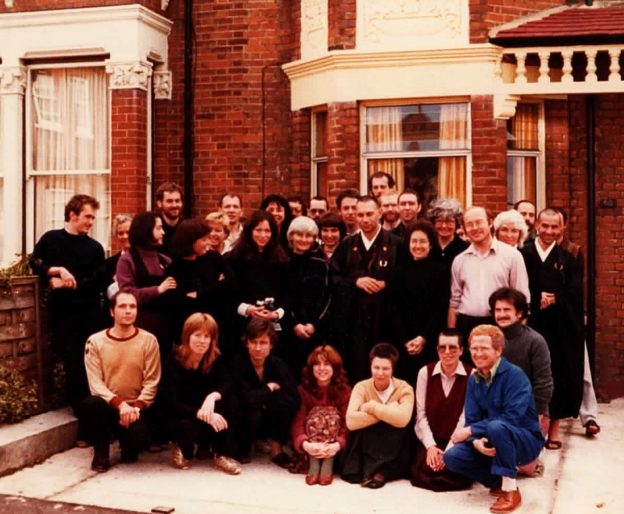I began Zen practice in 1983. I’d become interested in “spirituality” after abandoning a steady job to join a band of scruffy folkies touring Europe in 1979. I think I was looking for something to lean on in a time of insecurity. I read Krishnamurti, Gurdjieff and lots of other mumbo jumbo but felt strongly drawn most of all to Buddhism. It had a strong emotional and artistic appeal – the seated Buddha, the half-smile that said “I have gone beyond it”. I went on a kind of solo pilgrimage to India in 1982 to places like Bodh Gaya and when I came back it so happened there was a man calling himself “Shingen” just starting up a sitting group locally. He turned out to have encountered Genpo Sensei and Maezumi Roshi (neither of whom I’d ever heard of) and told me about a forthcoming weekend retreat in London. The photo is from that first weekend sesshin – I am there, but unrecognisable!
This was the famous terraced house in Dulwich owned by Colin and Sumi. I liked them – but hated the retreat and wasn’t impressed by Genpo. I said to myself “I’ll never do this again – maybe Tibetan would be better”. This felt like a “down” at the time – but it depends how you look at it. At least it was a taste of the real thing, instead of just reading about it. I was disillusioned – (not appreciating that that was the whole point in a way?!). Anyway I turned up for the next one, and the next – and kept coming back. I signed up for jukai with Maezumi Roshi, in 1984 I think, even though I didn’t appreciate what it meant. The house was too small really (but I received jukai there), so sesshins were moved to Amaravati. Colin and Sumi also invited Prabhasa Dharma Roshi, a Rinzai teacher, to host retreats. She gave me my first koan, which was exciting, but I was still going through hell on sesshins. I used to faint on the zafu sometimes. However, while doing kinhin at Amaravati with her, I suddenly saw something. Roshi approved this little glimmer of light and I expected everything to be plain sailing now I’d “got it”. Of course, I hadn’t “got” anything and this “up” was maybe really a down. My ego loved it!
Although I attended all the sesshins that came up – usually three a year, mostly at Amaravati – I felt an outsider, even though I was the regular Ino. Genpo had an inner circle and I definitely wasn’t part of it. This was partly my own doing – I enjoyed the silence and didn’t want idle chatter – and we were constantly told not to talk or socialise. There was pressure to do time at Bar Harbour, his place in Maine where he ran 3-month Angos. I felt I should commit more and go there – but something stopped me. Maybe I wasn’t really serious, or not desperate enough. I was also becoming weary of the samurai-style play-acting – the macho screaming and shouting and the enthusiastic use of the kyosaku – people sitting through kinhin to show how deep in samadhi they were. (Dropping the ego? – ha!). And I didn’t like the sycophancy that had grown up. So you might say this was a “down” period. But again – although I didn’t go in for the posturing too much, I did wield a mean kyosaku, and as Ino I got annoyed if people weren’t paying attention and got the ceremonies or chanting wrong. I even got to love the oryoki ritual at mealtimes. I’m sure I came across as a self-important prat.
So the “ups” – well, Genpo Sensei, as he was then, could be very inspirational. My initial misgivings were probably based on an idea I had of what a Zen teacher should look like – Maezumi Roshi fitted the image nicely. One sesshin participant described Genpo, jokingly, as a “beach bum and lounge lizard”. But his teaching was very creative and insightful, a driving force, and I’ve never forgotten some of his dharma talks. He had drawing power, and up to 90 people were coming on sesshins at Amaravati. However, as well one needs to be wary of charisma sometimes.
Everyone wants to be friends with the teacher, to be their “chosen one” – but of course, the teacher is there to wield the killing sword at some point, not to make your ego swell even more. So I’ll always be grateful to Genpo. He’s had a bit of a kicking recently from the puritans, but people forget how much work he did coming over to Europe for years doing sesshin after sesshin in often pretty basic accommodation. He famously didn’t really like England (or the English!) but he broke the ground for what has become the soundly-based tradition that we benefit from now.
I took up teaching Buddhism in prisons in 1988 or thereabouts. A prisoner, who became quite devoted to Buddhist practice, asked me how long I had been practising. When I told him he said – “ Wow! You must surely be enlightened by now”!
You’d think so, wouldn’t you? I may be wrong but I no longer practise for enlightenment, or kensho. I see now that what keeps me going is simply that zazen enhances my life, makes it more vivid, and perhaps, in the words of Maezumi Roshi, helps me appreciate my life. I have never finished a retreat without feeling enriched by it – a balance being restored. It doesn’t last, of course, but then nothing does.

